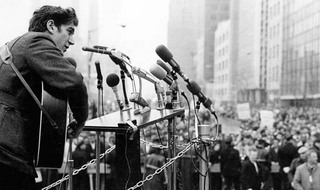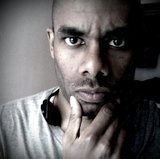
"Phil Ochs: There But for Fortune" plays Monday, January 23, at 10 pm EST/PST on PBS American Masters. It will thereafter be available via PBS On Demand, and is currently on Netflix Instant and DVD.

"Mistakes are lodged like harpoons and fish hooks in an intelligent person's soul," says one friend of political folk singer Phil Ochs of the deep depression that eventually led him to suicide in 1976. Och's friends are like that, eloquent and insightful. His mentor Pete Seeger, in particular, speaks like he sings, modulating his voice to give anecdotes a mythic luster and heartbreaking resonance. But after watching "Phil Ochs: There But for Fortune" take a measure of the man's adult life, it seems that some friends put too much emphasis on generic therapist's reasons for his downward spiral -- schizophrenia, alcoholism, declining popularity. It seems that Phil Ochs' fall was inevitable, given the fact that his singing career began when he was barely out of his teens, when JFK's assassination was a couple years off, and crashed after every progressive movement for which his protest songs provided spiritual fuel was crushed.

This is not a standard pop star rise-and-fall story. Ochs was physically involved in the antiwar and social justice movements he sang along with. He headlined, organized and even spontaneously showed up at a staggering number of rallies for various causes. His investment was evident in his performances, presented here with shocking audiovisual fidelity. Even though it's captured on a black-and-white kinescope, a performance of his song "When I'm Gone" feels as clear and urgent as a live event. So, too, is his strumming and crooning at the 1964 Newport Music Festival. (Simply amazing sound and image restoration here.) The sonorous voice and wide, earnest eyes could just as easily belong to a Wall Street occupier serenading Zuccoti Park.

Ochs' ego is said to have been outsized, pushing him to seek the kind of crossover success that his folk singer pal Bob Dylan seemed to achieve effortlessly. The political specificity of Ochs' music would guarantee that he never gained such popularity. After the Kennedy assassination, Dylan eased away from political folk music -- and from Ochs -- toward more personal and experimental work that somehow had far more appeal than Ochs' simple moral entreaties. The evidence gathered in this film suggests that, for Ochs, the friendly rivalry wasn't just about record sales. He was after a kind of political influence that presidents and industrialists commanded. While Ochs wanted to stop the Vietnam War cold, Dylan, increasingly, wanted to do for the counterculture only as much as wouldn't interfere with his pop-rock ascendancy. Ochs eschewed electric guitars just as they were becoming the guarantor of superstardom. Dylan plugged in as early as 1965, outraging folk traditionalists but gaining new legions of rock fans.

Instead of plugging in, Ochs fleshed out his acoustic sound with full bands and orchestral ensembles. Nothing he tried resulted in a hit record. It appears that his melodious, subtly satirical style was drowned out by Age of Aquarius amps and drug culture. Ochs responded by trying to present himself as a model for true rock stars to follow. "If there's any hope for America, it lies in a revolution," he said during his late-60's attempt at bridging the gap between the disaffected working class pop consumer and the hippie. "And if there's any hope for a revolution in America, it lies in getting Elvis Presley to become Che Guevara." He took up with the Yippies. He dressed in a gold lame suit and called his 1970 album Phils Och's Greatest Hits. He organized a massive fake celebration of the Vietnam War's "end" in 1967. (These stunts make him perhaps the grandfather of hipster irony as we know it.) Nothing worked. The war escalated, and leader after leader died in a hail of bullets. Ochs consoled himself by drinking heavily.

This documentary gives us very little of Ochs' home life or formative years in El Paso, Texas. It's as if he were born in New York's East Village folk scene and "died" roughly around the time he released an album titled Rehearsals for Retirement in response to the violence at the 1968 Democratic Convention in Chicago. (On the cover: a tombstone hinting that the convention "killed" him.) But today's best documentaries are not for completists -- or rather they are, if the completist understands that the function of such films in the Google and Wikipedia era is to tell a dynamic story that compels one to investigate further. It's a great time for documentary as storytelling and stimulus for learning rather than bean counting. In that sense, one of the film's most arresting touches is the use of split screen to show our survivor-of-the-60's talking heads right beside their younger selves.

The most fascinating segment of "There But for Fortune" chronicles a turn of events familiar from the life of so many American dissidents. Effectively "dead" in America, Ochs went abroad, searching for compatriots in countries where American imperialism left bloody boot prints. He recorded an album with African musicians (another pioneering effort, decades ahead of World Music projects by the likes of Paul Simon, Ry Cooder and Damon Albarn.) He landed in Chile just in time to witness the rise of its democratically elected Marxist leader Salvador Allende and finally find a hero to eclipse Dylan, Chilean protest singer Victor Jara (the subject of a 1976 song adapted by Arlo Guthrie from a poem by Jara's friend Adrian Mitchell).

The tragedies that ensued, beginning on September 11, 1973, set Ochs' path to suicide on a straighter course. Once legendary for his output, he stopped writing songs altogether. All the way down, he blamed the FBI and the CIA, for interfering not only in the causes he championed, but in his personal life. What a way to go out.

Ochs' friends, former managers, fellow musicians and writers all give their opinion on what prevented him from climbing out of depression, but the best description of what set Ochs apart comes from a talking head who knew him only through his work, Christopher Hitchens: "There was difference between people who liked Bob Dylan -- because anybody could like Bob Dylan, everybody did -- and those who even knew about Phil Ochs." Hitchens explains further in a clip not included in the documentary, but I prefer the way it's edited in the film, leaving us to investigate the why and how of it, in the same way that Ochs' songs provoked not just contemplation but action.

Steven Boone is a writer-at-large at Capital New York, conrtibutor to Fandor's Keyframe blog and Indiewire's Press Play blog. He experiments with images and video at Hentai Lab.





